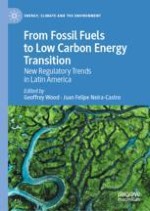2022 | OriginalPaper | Buchkapitel
14. Epilogue: Changing Latin America Through the Energy Transformation?
verfasst von : Ignacio Herrera Anchustegui
Erschienen in: From Fossil Fuels to Low Carbon Energy Transition
Aktivieren Sie unsere intelligente Suche, um passende Fachinhalte oder Patente zu finden.
Wählen Sie Textabschnitte aus um mit Künstlicher Intelligenz passenden Patente zu finden. powered by
Markieren Sie Textabschnitte, um KI-gestützt weitere passende Inhalte zu finden. powered by
